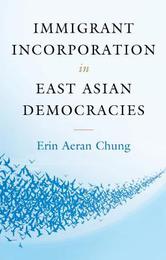
|
Immigrant Incorporation in East Asian Democracies
Hardback
Main Details
| Title |
Immigrant Incorporation in East Asian Democracies
|
| Authors and Contributors |
By (author) Erin Aeran Chung
|
| Physical Properties |
| Format:Hardback | | Pages:270 | | Dimensions(mm): Height 160,Width 235 |
|
| Category/Genre | Asian and Middle Eastern history |
|---|
| ISBN/Barcode |
9781107042537
|
| Classifications | Dewey:325.5 |
|---|
| Audience | | Professional & Vocational | | Tertiary Education (US: College) | |
|---|
|
Publishing Details |
| Publisher |
Cambridge University Press
|
| Imprint |
Cambridge University Press
|
| Publication Date |
8 October 2020 |
| Publication Country |
United Kingdom
|
Description
Despite labour shortages and rapidly shrinking working-age populations, Japan, South Korea, and Taiwan shared restrictive immigration policies and exclusionary practices toward immigrants until the early 2000s. While Taiwan maintained this trajectory, Japan took incremental steps to expand immigrant services at the grassroots level, and South Korea enacted sweeping immigration reforms. How did convergent policies generate these divergent patterns of immigrant incorporation? Departing from the dominant scholarship that focuses on culture, domestic political elites, and international norms, this book shows the important role of civil society actors - including immigrants themselves - in giving voice to immigrant interests, mobilizing immigrant actors, and shaping public debate and policy on immigration. Based on more than 150 in-depth interviews and focus groups with over twenty immigrant communities, Immigrant Incorporation in East Asian Democracies examines how the civic legacies of past struggles for democracy shape current movements for immigrant rights and recognition.
Author Biography
Erin Aeran Chung holds the Charles D. Miller Chair in East Asian Politics at Johns Hopkins University. Her research has been supported by the Academy of Korean Studies, the Japan Foundation, and the Social Science Research Council. She is the author of Immigration and Citizenship in Japan (Cambridge, 2010).
Reviews'This pioneering book offers one of the first systematic comparative studies of immigration and citizenship regimes in Japan, South Korea, and Taiwan. Erin Aeran Chung unpacks both the structural similarities among the three cases and their surprising divergences in the 2000s. Chung demonstrates how civil society and preexisting patterns of civic legacies explain how Korea has changed more than Japan, and why Taiwan has liberalized the least. This is a must-read book for students of migration studies and those interested in the politics and societies of Japan, Korea, and Taiwan.' Yves Tiberghien, University of British Columbia 'Going against the grain, Chung's innovative and meticulous analysis reveals the crucial role of civic legacies in shaping inclusionary immigration and citizenship policies for some in East Asia. This brilliant work will spark a major reassessment of our basic assumptions on immigrant integration. A major contribution.' Kamal Sadiq, University of California, Irvine 'Erin Aeran Chung tells a compelling story how the three East Asian democracies, which started from strictly exclusionary policies, have embarked on different pathways of immigrant incorporation. The main protagonist of change is not the state but civil society, and each society's civic legacies determine the trajectory of reform. This book does not merely fill a large gap in the comparative literature, it also provides a powerful analysis of policy change from below that calls for being tested in other cases.' Rainer Bauboeck, European University Institute, Florence
|